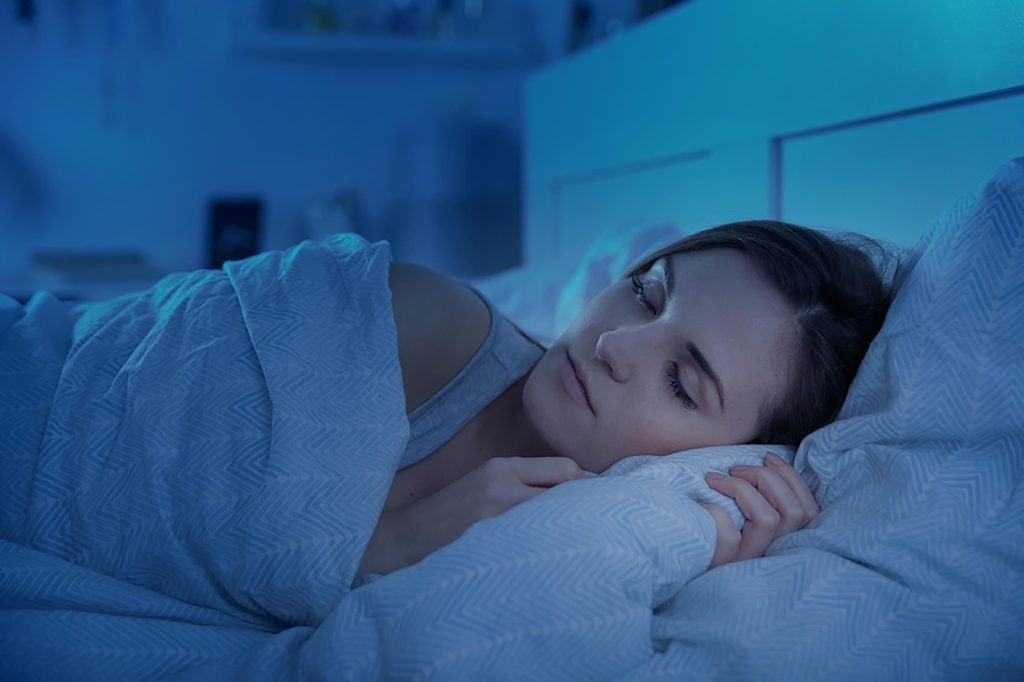This $129 Item Will Help You Sleep Like a Baby Every Single Night
Updated: Oct. 06, 2022
Could slipping under a 15- to 30-pound blanket help you beat your insomnia?
 You toss and turn. You’ve tried all the insomniacs’ tricks for getting more shut-eye. If a good night’s sleep is still something you can only dream about, there may be an easy solution: a weighted blanket. Research suggests the extra weight can help insomniacs sleep sounder—according to a 2020 study by the American Academy of Sleep Medicine, participants who used a weighted blanket for four weeks reported reduced insomnia, better sleep, more energy and fewer symptoms of fatigue, depression and anxiety.
You toss and turn. You’ve tried all the insomniacs’ tricks for getting more shut-eye. If a good night’s sleep is still something you can only dream about, there may be an easy solution: a weighted blanket. Research suggests the extra weight can help insomniacs sleep sounder—according to a 2020 study by the American Academy of Sleep Medicine, participants who used a weighted blanket for four weeks reported reduced insomnia, better sleep, more energy and fewer symptoms of fatigue, depression and anxiety.
Get The Healthy @Reader’s Digest newsletter
So is it a good fit for you? A weighted blanket is pretty much what it sounds like: Made up of pellet-filled pockets, it weighs anywhere from four to 30 pounds. The concept stems from deep-touch therapy, often used for children on the autism spectrum, which uses the idea that heavy, secure contact helps ground and relax a person by increasing the release of the mood-lifting neurotransmitter serotonin.
One proponent of deep-touch therapy is Temple Grandin, PhD, a professor of animal science at Colorado State University. As someone with autism and an advocate for people with the condition, Dr. Grandin explained the benefits of deep touch therapy in the Journal Of Child And Adolescent Psychopharmacology: “In animals, the tickle of a fly landing on the skin may cause a cow to kick, but the firm touch of the farmer’s hands quiets her. Occupational therapists have observed that a very light touch alerts the nervous system, but deep pressure is relaxing and calming.” Dr. Grandin adds on her website that people most likely to benefit from this kind of therapy are the ones who may “seek deep pressure by rolling up in blankets or who get under mattresses.”
10 Best Weighted Blankets According to Amazon Reviews
Research published in the Journal of Alternative and Complementary Medicine suggests that the blankets can lower levels of cortisol, a stress hormone. A 2015 Swedish study sponsored by a weighted blanket manufacturer found that the blankets improved insomniacs’ sleep quality and length. Another study published in Occupational Therapy in Mental Health found that the blankets successfully decreased distress and visible signs of anxiety in patients; 20 out of 32 participants reported feeling less anxious after using one.
Because sleeplessness and anxiety feed off each other, using a weighted blanket may help stop this vicious cycle. If you want to try one out, check with your doctor and heed the manufacturer’s advice on choosing a blanket; typically you’ll want one that’s 5 to 10 percent of your body weight. And if you do buy one, you’ll want to know how to wash a weighted blanket next.
For more wellness updates, follow The Healthy on Facebook, Instagram, and Twitter. Keep reading:
